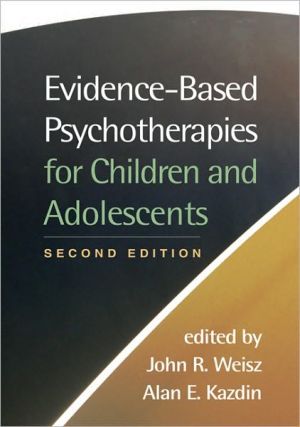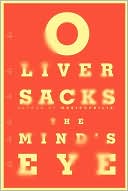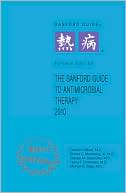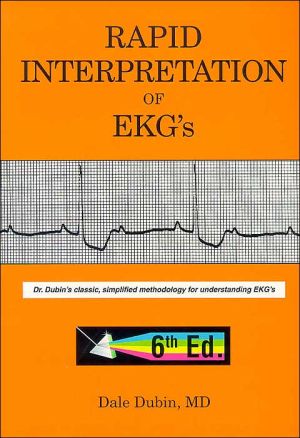Evidence-Based Psychotherapies for Children and Adolescents
Widely regarded as a premier text and clinical resource, this book presents exemplary treatment approaches for a broad range of social, emotional, and behavioral problems in children and youth. Concise chapters from leading authorities describe the conceptual underpinnings of each therapy, how interventions are delivered on a session-by-session basis, and what the research shows about treatment effectiveness. Contributors discuss recommended manuals and other clinical and training resources...
Search in google:
Widely regarded as a premier text and clinical resource, this book presents exemplary treatment approaches for a broad range of social, emotional, and behavioral problems in children and adolescents. Concise chapters from leading authorities describe the conceptual underpinnings of each therapy, how interventions are delivered on a session-by-session basis, and what the research shows about treatment effectiveness. Contributors discuss recommended manuals and other clinical and training resources and provide details on how to obtain them. New to This Edition *Significantly revised and expanded to incorporate current findings and treatment advances. *Treatments for additional disorders: obsessive–compulsive disorder, substance use disorders, and posttraumatic stress disorder. *An entire section (7 chapters) on implementation and dissemination challenges in real-world clinical settings, including a chapter on cultural diversity issues.
I. Foundations of Child and Adolescent Psychotherapy Research1. Introduction: Context, Background, and Goals, Alan E. Kazdin and John R. Weisz2. Ethical Issues in Child and Adolescent Psychosocial Treatment Research, Kimberly Eaton Hoagwood and Mary A. Cavaleri3. Developmental Issues and Considerations in Research and Practice, Grayson N. Holmbeck, Katie A. Devine, and Elizabeth F. BrunoII. Treatments and ProblemsA. Internalizing Disorders and Problems4. Child-Focused Treatment of Anxiety, Philip C. Kendall, Jami M. Furr, and Jennifer L. Podell5. Interventions for Anxiety Disorders in Children Using Group Cognitive-Behavioral Therapy with Family Involvement, Kristine M. Pahl and Paula M. Barrett6. Treating Pediatric Obsessive–Compulsive Disorder Using Exposure-Based Cognitive-Behavioral Therapy, Martin E. Franklin, Jennifer Freeman, and John S. March7. Cognitive-Behavioral Therapy for Depression: The ACTION Treatment Program for Girls, Kevin D. Stark, William Streusand, Lauren S. Krumholz, and Puja Patel8. Group Cognitive-Behavioral Treatment for Adolescent Depression, Gregory N. Clarke and Lynn L. DeBar9. Treating Depression in Adolescents Using Individual Cognitive-Behavioral Therapy, V. Robin Weersing and David A. Brent 10. Treating Adolescent Depression Using Interpersonal Psychotherapy, Colleen M. Jacobson and Laura MufsonB. Externalizing Disorders and Problems11. Parent Management Training—Oregon Model: An Intervention for Antisocial Behavior in Children and Adolescents, Marion S. Forgatch and Gerald R. Patterson12. Parent–Child Interaction Therapy and the Treatment of Disruptive Behavior Disorders, Alison Zisser and Sheila M. Eyberg 13. The Incredible Years Parents, Teachers, and Children Training Series: A Multifaceted Treatment Approach for Young Children with Conduct Disorders, Carolyn Webster-Stratton and M. Jamila Reid14. Problem-Solving Skills Training and Parent Management Training for Oppositional Defiant Disorder and Conduct Disorder, Alan E. Kazdin15. Anger Control Training for Aggressive Youths, John E. Lochman, Caroline L. Boxmeyer, Nicole P. Powell, Tammy D. Barry, and Dustin A. Pardini16. Multidimensional Treatment Foster Care for Adolescents: Processes and Outcomes, Dana K. Smith and Patricia Chamberlain17. Treating Serious Antisocial Behavior Using Multisystemic Therapy, Scott W. Henggeler and Cindy Schaeffer18. Summer Treatment Programs for Attention-Deficit/Hyperactivity Disorder, William E. Pelham, Jr., Elizabeth M. Gnagy, Andrew R. Greiner, Daniel A. Waschbusch, Gregory A. Fabiano, and Lisa Burrows-MacLeanC. Other Disorders and Special Applications19. Trauma-Focused Cognitive-Behavioral Therapy for Traumatized Children, Judith A. Cohen, Anthony P. Mannarino, and Esther Deblinger20. Early and Intensive Behavioral Intervention in Autism, Tristram Smith 21. Empirically Supported Pivotal Response Treatment for Children with Autism Spectrum Disorders, Robert L. Koegel, Lynn K. Koegel, Ty W. Vernon, and Lauren I. Brookman-Frazee22. Family Therapy for Adolescents with Anorexia Nervosa, Arthur L. Robin and Daniel le Grange23. Behavioral Treatment for Enuresis, Arthur C. Houts 24. Treating Hispanic Youths Using Brief Strategic Family Therapy, Michael S. Robbins, Viviana Horigian, José Szapocznik, and Jessica Ucha25. Treating Hispanic Children and Adolescents Using Narrative Therapy, Robert G. Malgady26. Functional Family Therapy for Adolescent Substance Use Disorders, Holly Barrett Waldron and Janet L. Brody27. Treating Adolescent Substance Abuse Using Multidimensional Family Therapy, Howard A. LiddleIII. Implementation and Dissemination: Extending Treatments to New Populations and New Settings 28. Implementation of Evidence-Based Treatments for Children and Adolescents: Research Findings and Their Implications for the Future, Dean L. Fixsen, Karen A. Blase, Michelle A. Duda, Sandra F. Naoom, and Melissa Van Dyke 29. Assessing the Effects of Evidence-Based Psychotherapies with Ethnic-Minority Youths, Stanley J. Huey, Jr., and Antonio J. Polo30. Adapting Cognitive-Behavioral Therapy for Depression to Fit Diverse Youths and Contexts: Applying the Deployment-Focused Model of Treatment Development and Testing, Sarah Kate Bearman, Ana Ugueto, Alisha Alleyne, and John R. Weisz31. Building Evidence-Based Systems in Children’s Mental Health, Bruce F. Chorpita and Eric L. Daleiden32. Nationwide Dissemination of Effective Parenting Interventions: Building a Parenting Academy for England, Stephen Scott33. The International Dissemination of the Triple P—Positive Parenting Program, Matthew R. Sanders and Majella Murphy-Brennan34. From Policy Pinball to Purposeful Partnership: The Policy Contexts of Multisystemic Therapy Transport and Dissemination, Sonja K. SchoenwaldIV. Conclusions and Future Directions35. The Present and Future of Evidence-Based Psychotherapies for Children and Adolescents, John R. Weisz and Alan E. Kazdin
\ Counselling Children and Young People"This is an excellent academic text for anyone wanting to seriously consider what may be the most effective way of working with this client group, or for students who need to compare different therapeutic interventions."--Counselling Children and Young People\ \ \ \ \ Doody ReviewsReviewer: Gary B Kaniuk, Psy.D. (Cermak Health Services) \ Description: This book presents therapy options for various internalizing and externalizing disorders of children and adolescents. These treatments are evidence-based, shown to be effective through research studies. The first edition was published in 2003.\ Purpose: According to the editors in the preface, "We want to convey in this book the broad sweep of the field, capturing well-established treatments and illustrating the strategies being used by clinical scientists as they build treatments and enrich the evidence base in diverse ways.\ Audience: The book is designed for "clinical scientists, including those early in their careers launching programs on effective intervention; to clinical practitioners, including those seeking to broaden their array of skills in the best tested practices and those willing to partner with clinical scientists in testing and improving psychotherapies; to policymakers and payers, who need hard data to inform hard decisions about support for new services; and to parents and other caring adults, who seek to navigate a landscape populated with claims and counterclaims about treatment options for their children." I would add that graduate students in psychology, social work, and psychiatry would find this book useful. John Weisz is professor of psychology at Harvard University and President/CEO of the Judge Baker Children's Home. Alan Kazdin is professor of psychology and child psychiatry at Yale University and director of an outpatient clinic addressing the needs of children and families. \ Features: The book begins with a discussion of ethical and developmental issues. The authors emphasize that addressing the developmental level of the child is foundational, along with knowing its effect as a mediator and moderator regarding efficacy. Next, the book next examines internalizing disorders and externalizing disorders. Chapters on internalizing disorders cover anxiety, obsessive-compulsive disorder, and depression. Treatments discussed for externalizing disorders are Parent Management Training (antisocial behavior) , Incredible Years Parents, Teachers, and Children Training series (conduct disorder) , problem-solving skills training, and anger control. The authors also focus on treatment for trauma, autism spectrum disorders, and substance use disorders. Finally, the book discusses evidence-based interventions with ethnic minority youths and in developing evidence-based systems within individual states. Numerous tables and figures are extremely helpful in clarifying the text, especially in light of the extensive research findings that are presented. The treatment chapters contain practical information, either in terms of session by session or specific techniques/strategies. Chapter 15, on anger control training for aggressive youths, is an example of how many of the chapters are organized, covering as it does the social-cognitive prevention model, characteristics of the treatment program and content of each session, research evidence, and overall evaluation of the program. \ Assessment: This is excellent book covers both internalizing and externalizing disorders and problems. The authors do a good job of describing the various interventions, even providing information session by session. This second edition is justified with the additional topics, including obsessive-compulsive disorder, substance use disorders, and posttraumatic stress disorder, and the increased emphasis on cross-cultural intervention.\ \ \ From The CriticsReviewer: Gary B Kaniuk, Psy.D.(Cermak Health Services)\ Description: This book presents therapy options for various internalizing and externalizing disorders of children and adolescents. These treatments are evidence-based, shown to be effective through research studies. The first edition was published in 2003.\ Purpose: According to the editors in the preface, "We want to convey in this book the broad sweep of the field, capturing well-established treatments and illustrating the strategies being used by clinical scientists as they build treatments and enrich the evidence base in diverse ways."\ Audience: The book is designed for "clinical scientists, including those early in their careers launching programs on effective intervention; to clinical practitioners, including those seeking to broaden their array of skills in the best tested practices and those willing to partner with clinical scientists in testing and improving psychotherapies; to policymakers and payers, who need hard data to inform hard decisions about support for new services; and to parents and other caring adults, who seek to navigate a landscape populated with claims and counterclaims about treatment options for their children." I would add that graduate students in psychology, social work, and psychiatry would find this book useful. John Weisz is professor of psychology at Harvard University and President/CEO of the Judge Baker Children's Home. Alan Kazdin is professor of psychology and child psychiatry at Yale University and director of an outpatient clinic addressing the needs of children and families. \ Features: The book begins with a discussion of ethical and developmental issues. The authors emphasize that addressing the developmental level of the child is foundational, along with knowing its effect as a mediator and moderator regarding efficacy. Next, the book next examines internalizing disorders and externalizing disorders. Chapters on internalizing disorders cover anxiety, obsessive-compulsive disorder, and depression. Treatments discussed for externalizing disorders are Parent Management Training (antisocial behavior), Incredible Years Parents, Teachers, and Children Training series (conduct disorder), problem-solving skills training, and anger control. The authors also focus on treatment for trauma, autism spectrum disorders, and substance use disorders. Finally, the book discusses evidence-based interventions with ethnic minority youths and in developing evidence-based systems within individual states. Numerous tables and figures are extremely helpful in clarifying the text, especially in light of the extensive research findings that are presented. The treatment chapters contain practical information, either in terms of session by session or specific techniques/strategies. Chapter 15, on anger control training for aggressive youths, is an example of how many of the chapters are organized, covering as it does the social-cognitive prevention model, characteristics of the treatment program and content of each session, research evidence, and overall evaluation of the program. \ Assessment: This is excellent book covers both internalizing and externalizing disorders and problems. The authors do a good job of describing the various interventions, even providing information session by session. This second edition is justified with the additional topics, including obsessive-compulsive disorder, substance use disorders, and posttraumatic stress disorder, and the increased emphasis on cross-cultural intervention.\ \ \ \ \ From the Publisher"There are no easy answers in the national debate on evidence-based practice, and this book doesn't offer easy solutions. Instead, Weisz and Kazdin capture the complexity of the issue and help my students articulate the important questions that need to be answered. Cutting-edge chapters on specific treatment approaches are written by leading psychotherapy researchers. The volume is rich in detail about the nuances of manualized interventions; clearly tells the story of the interventions' development and evaluation; and links the interventions to theoretical frameworks. I appreciate the fact that the chapters span multiple theoretical frameworks, with a strong emphasis on cognitive-behavioral interventions. This is an important book on psychological services for children and adolescents."--Beth Doll, PhD, School Psychology Program, University of Nebraska-Lincoln\ "This impressive work presents clearly articulated psychosocial interventions that are applicable to a wide range of child and adolescent problems encountered in clinics, homes, schools, and other settings. When used with careful attention to client characteristics and preferences, the ideas and methods in this volume offer practical direction and structure for delivering coherent psychotherapy services to young people and their caregivers."--John J. Murphy, PhD, Department of Psychology and Counseling, University of Central Arkansas "An expertly edited, impressive, comprehensive, and cutting-edge reference. This volume covers not only interventions that are well established, but also those undergoing development and testing, including innovative approaches that are pushing the field in new directions. It clearly will be an invaluable resource for clinical scientists; for practitioners striving to incorporate evidence-based treatments into clinical and community settings; and for graduate students in clinical, counseling, and school psychology. The book is readable and user friendly, making it an excellent classroom text for graduate-level courses in psychological interventions."--Annette M. La Greca, PhD, ABPP, Cooper Fellow and Professor of Psychology and Pediatrics, University of Miami "The editors and contributors are all experts in their fields who are committed to integrating research and practice, resulting in a work that is both comprehensive in scope and practical in application. Particularly noteworthy additions to the second edition include advances in developing ethnically and culturally sensitive interventions and emerging issues in treatment implementation and dissemination. I highly recommend this book to any clinician committed to evidence-based practice with children and adolescents--which should mean everyone! It also would make an excellent text for graduate courses in school psychology, counselor education, counseling psychology, clinical child psychology, and social work."--David N. Miller, PhD, Department of Educational and Counseling Psychology, University at Albany, State University of New York "The second edition of this highly regarded work is essential for anyone who wants to be brought up to date on what is happening in the field. Weisz and Kazdin are the international leaders, and together with their excellent contributors, they demonstrate that a great deal of progress has been made. We have a better understanding of what works for which conditions, and we are beginning to gain a better grasp of what it is that brings the benefits. The book also discusses major challenges that still remain. This is a great reference that provides guidance on many important practical issues."--Michael Rutter, MD, FRS, Social, Genetic, and Developmental Psychiatry Research Centre, Institute of Psychiatry, London, United Kingdom \ "Fully updated and even more comprehensive and relevant to the real world, this second edition is most impressive. It is a 'must read' for advanced students, practitioners, and investigators. This volume sets a high bar with its all-too-rare combination of rigor and accessibility. Bravo!"--Stephen P. Hinshaw, PhD, Professor and Chair, Department of Psychology, University of California, Berkeley "This book sets the standard for presenting evidence-based psychological interventions for children and adolescents. The second edition adds to the breadth and depth of the original volume, with chapters on the treatment of additional disorders and a new section on implementing evidence-based interventions outside the boundaries of a typical study. Weisz and Kazdin are widely acknowledged leaders in the field. In the era of evidence-based practice, this definitive resource should be in every child clinician’s office."--David H. Barlow, PhD, ABPP, Professor of Psychology and Psychiatry, Boston University, and Interim Director, Center for Anxiety and Related Disorders\ \ \ \ \ From The CriticsReviewer: Gary B Kaniuk, Psy.D.(Cermak Health Services)\ Description: This book presents therapy options for various internalizing and externalizing disorders of children and adolescents. These treatments are evidence-based, shown to be effective through research studies. The first edition was published in 2003.\ Purpose: According to the editors in the preface, "We want to convey in this book the broad sweep of the field, capturing well-established treatments and illustrating the strategies being used by clinical scientists as they build treatments and enrich the evidence base in diverse ways.\ Audience: The book is designed for "clinical scientists, including those early in their careers launching programs on effective intervention; to clinical practitioners, including those seeking to broaden their array of skills in the best tested practices and those willing to partner with clinical scientists in testing and improving psychotherapies; to policymakers and payers, who need hard data to inform hard decisions about support for new services; and to parents and other caring adults, who seek to navigate a landscape populated with claims and counterclaims about treatment options for their children." I would add that graduate students in psychology, social work, and psychiatry would find this book useful. John Weisz is professor of psychology at Harvard University and President/CEO of the Judge Baker Children's Home. Alan Kazdin is professor of psychology and child psychiatry at Yale University and director of an outpatient clinic addressing the needs of children and families.\ Features: The book begins with a discussion of ethical and developmental issues. The authors emphasize that addressing the developmental level of the child is foundational, along with knowing its effect as a mediator and moderator regarding efficacy. Next, the book next examines internalizing disorders and externalizing disorders. Chapters on internalizing disorders cover anxiety, obsessive-compulsive disorder, and depression. Treatments discussed for externalizing disorders are Parent Management Training (antisocial behavior), Incredible Years Parents, Teachers, and Children Training series (conduct disorder), problem-solving skills training, and anger control. The authors also focus on treatment for trauma, autism spectrum disorders, and substance use disorders. Finally, the book discusses evidence-based interventions with ethnic minority youths and in developing evidence-based systems within individual states. Numerous tables and figures are extremely helpful in clarifying the text, especially in light of the extensive research findings that are presented. The treatment chapters contain practical information, either in terms of session by session or specific techniques/strategies. Chapter 15, on anger control training for aggressive youths, is an example of how many of the chapters are organized, covering as it does the social-cognitive prevention model, characteristics of the treatment program and content of each session, research evidence, and overall evaluation of the program.\ Assessment: This is excellent book covers both internalizing and externalizing disorders and problems. The authors do a good job of describing the various interventions, even providing information session by session. This second edition is justified with the additional topics, including obsessive-compulsive disorder, substance use disorders, and posttraumatic stress disorder, and the increased emphasis on cross-cultural intervention.\ \ \ \ \ Counselling Children and Young People"This is an excellent academic text for anyone wanting to seriously consider what may be the most effective way of working with this client group, or for students who need to compare different therapeutic interventions."--Counselling Children and Young People\ \ \








